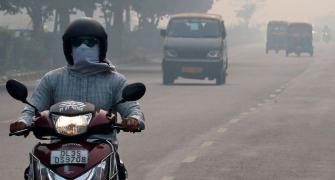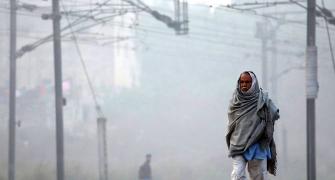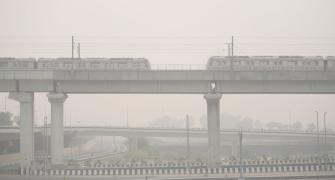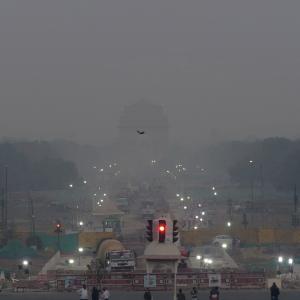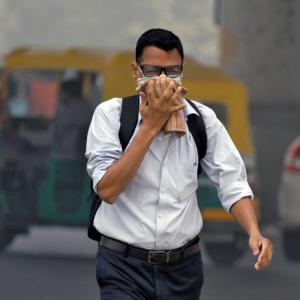'Till such time climatic activities resume up north in the plains and the hills, Mumbai's air quality may not improve.'

"This (high Air Quality Index) is the result more of vehicular pollution than construction activities. Whenever climatic conditions are not favourable, this is what is likely to happen, but it (AQI) should certainly improve in Mumbai going ahead."
Air Vice Marshal G P Sharma (retd), President (Meteorology and Climate Change), Skymet, tells Prasanna D Zore/Rediff.com why the air quality over Mumbai may not see a significant let up till January.
Mumbai's air quality has been worsening over last couple of weeks. We have been consistently breathing poor to very poor air with AQI above 300 for quite a few days in these two weeks. Why is the city facing experiencing such bad air quality?
That's the one off kind of thing for Mumbai. I have been monitoring that. Otherwise, it (the Air Quality Index or the AQI) has been close to 200 yesterday (December 11).
It is likely to improve for a few days with cloudy skies and expectation of rain. So it should not worsen now (for the next few days).
What is the reason for air being so bad over Mumbai in the past couple of weeks?
Basically, it all depends on the climatic conditions. Easterly winds have been lighter also and up north there has been low weather activity; for the last one-and-a-half months there have been no rains... all these things have come together for Mumbai (for air quality getting poorer).
Mumbai's weather purely flows from what happens over north (of India), particularly in the neighbouring states of Madhya Pradesh and Rajasthan; these regions have not been witnessing any rains, not much weather activity, light winds, cold winds blowing down the mountains up to there (MP and Rajasthan).
So all these factors compounded together have given rise to this (an AQI level above 300) in Mumbai.
You must have witnessed (in Mumbai) cold, clear winds in the morning coming from the land, northeasterly winds. Then between noon and 1 pm you have (warm) sea breeze coming in.
This total reversal of (weather) events is a natural phenomenon because of (Mumbai's) proximity to the sea and it is becoming more prominent with the result that you have a pool of air which is going round and round.
In the morning you have the northeasterly winds, in the afternoon you have the reversal from the other side (warm winds blowing from the sea towards the land) to a height of about three thousand feet (from the sea level) and you have a pool of air which is going round and round and the climatic parameters are not sufficient to break this barrier as such.
That is what has led to Mumbai experiencing poor air quality for a prolonged spell.
Usually, over Mumbai, we have low AQI during the monsoon, but soon after its withdrawal the AQI level starts rising. In any case, December and January are the worst months for Mumbai. This time that level (of poor air quality) is a little more aggravated in December.
This is a periodic phenomenon because this process (of worsening air quality) sets up above Mumbai where there is no rain after the monsoon withdraws for nearly five months.
It rains (in December or January) when some storm gathers on either of the two coasts -- the Bay of Bengal or the Arabian Sea -- bringing some rains to the city.
This time because of (cyclone) Mandous things may improve a bit for the next few days as it will change the wind patterns, bring some clouds and rain in Mumbai for the next few days.
Cyclone Mandous is likely to bring some relief to the people of Mumbai?
Yes, because the wind patterns will change, humidity will increase and dark clouds will form (over the Arabian Sea) and if that leads to rain then that will be the best climatic mitigation.
If it rains, it will bring down all pollutants (in air) and that will be the fastest and widest climatic mitigation.
Apart from climatic mitigation, what measures -- short term as well as long term -- can be taken to improve air quality over Mumbai?
Measures are there, but they are not, I think, within our reach.
Vehicular pollution... can we do anything? Nothing.
Construction activities? Can we do anything? Nothing.
So whatever (reasons of pollution) are there, we are only adding on to that (but about which) nothing can be done.
If we can control vehicular pollution and construction activities, then it is very good, but then what happens to economic activities?
But if we go for Delhi-like odd-even it will hurt the public as much and so the government will not do.
We are in a Catch-22 situation; if you do something there will be a hue and cry and on the other side if you don't do anything you have to go through these levels (of AQI above 300 indicating very poor quality of air).
I would say this (high AQI) is the result more of vehicular pollution than construction activities. Otherwise, whenever climatic conditions are not favourable, this is what is likely to happen, but it should certainly improve going ahead.
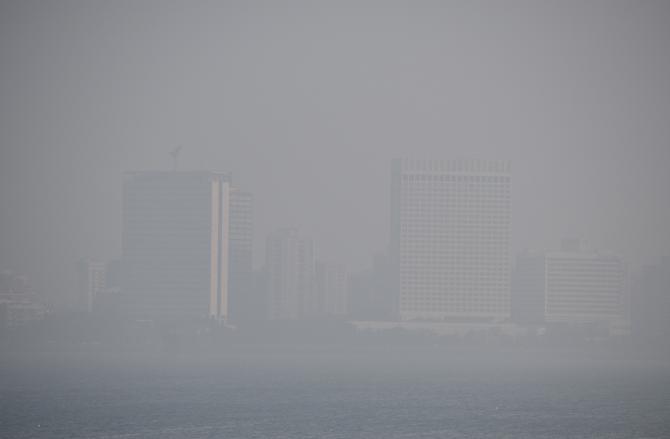
How does this pollution impact the well-being of the people of Mumbai?
Like any other cities with high pollution levels, we are also seeing some medical reports (hinting at worsening breathing problems). High pollution indeed affects public medical health.
The city is located such where the (climatic) activities cannot be controlled. You cannot control climatic parameters apart from controlling vehicular pollution.
One can only advise some senior citizens, small children, or those vulnerable with co-morbidities or suffering from lung and chest infections to not venture out unnecessarily till the time pollution levels drop in the city.
In a city like Mumbai you cannot restrict the (economic, commercial and social) activities. How can you control these?
How worse is it likely to get in December and January?
As soon as we start having some activities in the north, which has not begun so far like snowfall; there has been no rain for the significant part of the last two months and nothing much is expected in the next 10-15 days also.
Till such time these climatic activities resume up north in the plains and the hills you cannot expect very big relief (for Mumbai). Till then Mumbai's air quality may not improve tremendously.
We are likely to experience poor quality till then.
In Mumbai, the people are used to what the AQI is in the monsoon months (June-September) when it rains almost every other day. Then it remains good or satisfactory; rarely it goes to moderate. So, we are used to these levels.
In Delhi, round the clock, throughout the year, if it (AQI levels) becomes moderate, then it's like heaven.
Mumbai experiences very good air quality because of the rain during the four months -- it begins in June and almost goes till mid-October (In October from the retreating monsoon).
The people of Mumbai are not used to (moderate to high levels of AQI).

